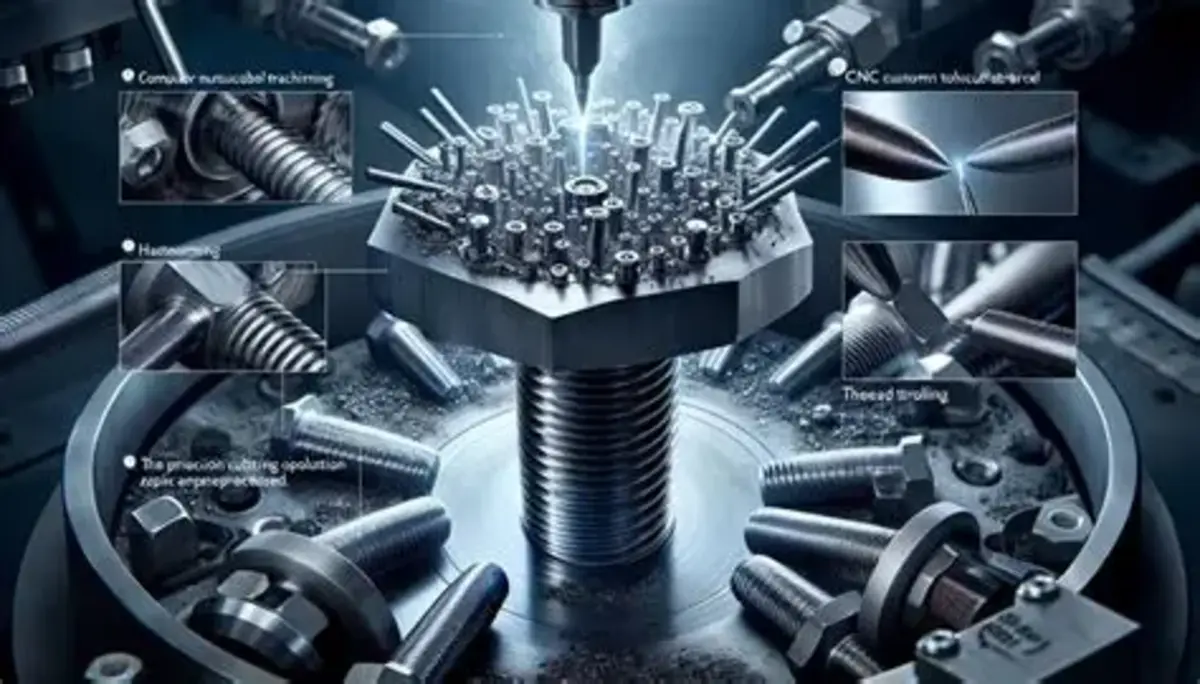In the fast-evolving world of industrial manufacturing, the humble bolt is undergoing a quiet revolution. Once seen as a standard hardware component, bolts are now at the forefront of innovation—driven by new materials, advanced design technologies, and the global push for lighter, stronger, and more sustainable solutions.
As industries—from aerospace and automotive to renewable energy and infrastructure—demand higher performance with lower environmental impact, the question is no longer if bolts will change, but how fast. This article explores how next-generation materials are reshaping bolt manufacturing and what it means for the future of engineering and design.
The Push Toward Lightweight and Durable Solutions
Every kilogram matters in modern engineering. In aerospace and automotive sectors, reducing weight directly translates to fuel savings, enhanced efficiency, and lower emissions. However, cutting weight cannot come at the cost of strength or reliability. This balance between lightness and durability is driving the industry to rethink traditional bolt materials like carbon steel and stainless steel.
Innovating bolt manufacturing today means finding materials that deliver exceptional tensile strength, corrosion resistance, and fatigue performance—while remaining cost-efficient and environmentally friendly.
Advanced Materials Leading the Change
1. Titanium Alloys: Lightweight Powerhouse
Titanium alloys have become a symbol of high-performance fastening solutions. With a strength-to-weight ratio far superior to steel and excellent corrosion resistance, titanium bolts are now essential in aerospace, marine, and motorsport applications. Their ability to perform under extreme temperatures also makes them a reliable choice for engines and exhaust systems.
However, titanium remains expensive to process. To address this, manufacturers are adopting new forging and surface treatment technologies that improve machinability and extend service life, reducing overall lifecycle costs.
2. Aluminum Alloys: The Efficiency Champion
Aluminum is not new to manufacturing, but next-generation aluminum alloys are redefining what’s possible. These modern alloys—enhanced with elements like magnesium or zinc—offer impressive strength and corrosion resistance at a fraction of the weight of steel.
In industries like electric vehicles (EVs) and aerospace, where lightweight design is critical, aluminum bolts help cut overall component weight while maintaining secure connections under vibration and thermal expansion.
Manufacturers are also introducing anodized coatings and hybrid aluminum-composite bolts to enhance wear resistance and aesthetic appeal.
3. High-Performance Polymers and Composites
One of the most exciting frontiers in innovating bolt manufacturing is the use of advanced polymers and carbon fiber composites. These materials, once considered too lightweight for structural fastening, are now entering niche applications thanks to advances in fiber-reinforced technology.
Composite bolts provide non-conductive, corrosion-proof, and magnetically neutral fastening—ideal for electronics, renewable energy installations, and medical devices. They are particularly valuable where metal bolts may introduce interference or galvanic corrosion.
4. Nano-Enhanced and Coated Steels
For applications requiring the familiarity and cost advantages of steel, nanotechnology offers a breakthrough. Nano-alloyed steels and advanced coatings enhance hardness, fatigue life, and resistance to extreme environmental conditions.
Zinc-nickel coatings, ceramic layers, and nano-ceramic conversions not only prevent corrosion but also extend maintenance intervals. This innovation is crucial for offshore, construction, and heavy machinery applications where bolt failure can lead to significant downtime.
Smart Manufacturing and Sustainability
Material innovation alone isn’t enough. The future of bolt manufacturing lies in combining advanced materials with smart production technologies—including precision forging, additive manufacturing (3D printing), and automated quality control.
Additive manufacturing, in particular, allows engineers to design bolts with complex geometries, optimized weight distribution, and internal reinforcement patterns that were once impossible through traditional machining. This means stronger, lighter, and more material-efficient components.
Sustainability is another major driver. As global industries commit to reducing their carbon footprint, bolt manufacturers are adopting greener production processes—using recycled metals, minimizing waste, and incorporating renewable energy sources in fabrication.
Innovating bolt manufacturing is therefore not just about performance—it’s about responsibility and long-term environmental impact.
Practical Benefits for Industry Applications
The adoption of lightweight and durable bolts translates into tangible advantages:
- Aerospace: Reduced fuel consumption and increased payload efficiency.
- Automotive: Better acceleration, improved EV range, and corrosion-resistant assembly.
- Construction: Longer lifespan and lower maintenance costs.
- Energy: Higher performance in harsh environments like offshore wind and solar installations.
- Manufacturing: Faster assembly and easier handling without compromising safety.
By investing in these next-generation materials, companies gain competitive advantages in reliability, sustainability, and total cost of ownership.
The Future of Bolt Innovation
As materials science continues to evolve, the line between hardware and high-tech is blurring. Bolts are no longer static components—they are becoming engineered solutions tailored for specific performance goals.
Looking ahead, we can expect further breakthroughs in hybrid materials, AI-driven design optimization, and self-monitoring fasteners capable of transmitting real-time performance data.
For manufacturers and engineers alike, the message is clear: staying ahead means embracing innovation not just in what we build—but in how we fasten it together.
In the age of advanced materials, even the smallest component can make the biggest difference.
The next generation of lightweight, durable bolts is not just holding structures together—it’s holding the future of innovation itself.
Tokohasil: The One-Stop Bolt & Nut Store You Can Trust
When every project depends on precision and strength, even the smallest part matters — especially baut and mur. At Tokohasil, you’ll find more than just hardware; you’ll find reliability packed into every thread and finish.
Tokohasil is your go-to bolt and nut store, offering an extensive range of fasteners for construction, automotive, machinery, and DIY needs. Whether you’re tightening up a steel structure, assembling furniture, or maintaining equipment, Tokohasil provides the perfect fit for every application.
What sets Tokohasil apart is its commitment to quality and convenience. Every bolt and nut in stock is sourced from trusted manufacturers and meets industry standards for strength and durability. The store offers multiple material options — from stainless steel for corrosion resistance to galvanized and high-tensile steel for heavy-duty use.
Shopping at Tokohasil means no guesswork. Their online platform makes it easy to browse sizes, compare specs, and order directly with fast, reliable delivery.
In short, Tokohasil isn’t just a store — it’s your partner in building stronger connections. From a single screw to a bulk order, they make sure every piece fits your project perfectly. Strong builds start with strong parts — and Tokohasil delivers both.




Leave a Reply